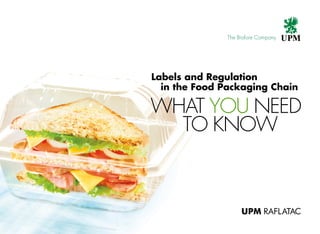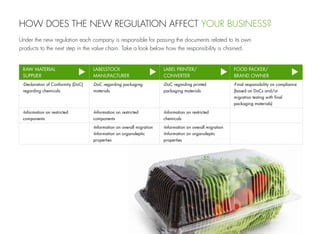Are your food labels legal? Labels and Regulation in the Food Packaging Chain: What you need to know
- 1. WHAT YOU NEED TO KNOW Labels and Regulation in the Food Packaging Chain
- 2. NEW EU REGULATION ŌĆō DO YOU KNOW YOUR RESPONSIBILITIES? The new regulation EU 10/2011 on plastic food packaging materials now also includes labels. This affects the whole food packaging chain so we decided to compile a guidebook to support ensuring your labellling chain compliance.
- 3. The new regulation dictates that end-users and brand owners have the final responsibility to check the compliance. This brochure has been produced to help you with this task. So letŌĆÖs start with quick facts. EU Regulation 10/2011 on plastic food packaging materials ŌĆó Valid since Jan 1st 2013 ŌĆó Label now classified as being part of the food package ŌĆó All packaging materials, including self-adhesive labels applied to food packages need to comply with the Frame Regulation EC 1935/2004. ŌĆó In addition, films and adhesives must comply with the Regulation EU 10/2011 on plastic food packaging materials.
- 4. HOW DOES THE NEW REGULATION AFFECT YOUR BUSINESS? Under the new regulation each company is responsible for passing the documents related to its own products to the next step in the value chain. Take a look below how the responsibility is chained. CHEMICAL SUPPLIER PACKAGING / LABEL MANUFACTURER PRINTING HOUSE FOOD PACKAGING COMPANY Declaration of Conformity (DoC) regarding chemicals DoC regarding packaging materials DoC regarding printed packaging materials Final responsibility on compliance (based on DoCs and/or migration testing with final packaging materials) Information on restricted components Information on restricted components Information on restricted chemicals Information on overall migration Information on organoleptic roperties Information on overall migration Information on organoleptic properties
- 5. DECLARATION OF CONFORMITY THE WHAT, WHY AND HOW A Declaration of Conformity (DoC) is a formal document confirming that the particular product is compliant with the requirements of the regulation. A DoC is needed for both direct and indirect food contact packaging scenarios. The indirect scenario means a possibility for the packaging substances to transfer into the food.
- 6. For UPM Raflatac products, DoCs have been drawn up for quick and convenient distribution. Just contact your local UPM Raflatac representative to get the DoC you need.
- 7. Are your labels compliant? Unless you guarantee compliance, you risk having a costly recall and damaging your brand and customer relations. Product recalls might mean huge associated costs ŌĆō not to mention possible stains on reputation.
- 8. KEEPING YOUR BRAND FRESH, SAFE AND LEGAL UPM Raflatac has many products and solutions crafted to meet the needs of the food segment and tested to comply with regulations and standards. All food end-use solutions have a DoC available upon request, which in turn expedites an agile adoption to a compliant packaging chain.
- 9. BEST EXPERTISE IN THE MARKET UPM Raflatac is a part of UPM -- The Biofore Company. That means we are committed to bringing safer, better and more responsible solutions to all business segments we operate in. Our company values, vision and expertise give us decisive advantage in explaining business implications of new regulations to our customers. Working with UPM Raflatac, you receive a global level of service by our customer-oriented and highly qualified professionals. Visit www.upmraflatac.com and contact your local UPM Raflatac representative to get started.











